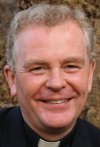
|
Clergy and laity
The Rectory - June 2003
 Some months ago, I published in this column a specimen
extract from my diary. It caused some interest and concern! At the time, I explained perhaps a
little naively that it was not done to complain or to provoke expressions of sympathy, but rather to
help those who might still think that clergy only work one day a week to see that actually
life can be quite complicated, very diverse, and sometimes a bit busy (like many other
peoples lives, in fact!).
Some months ago, I published in this column a specimen
extract from my diary. It caused some interest and concern! At the time, I explained perhaps a
little naively that it was not done to complain or to provoke expressions of sympathy, but rather to
help those who might still think that clergy only work one day a week to see that actually
life can be quite complicated, very diverse, and sometimes a bit busy (like many other
peoples lives, in fact!).
We have just returned from ten days in Scotland the north-west coast, where we love to be, staying in a little and very isolated village called Glenelg. Some of you, I know, know it it is walkers paradise, nestled at the foot of Beinn Sgriathell, one of the highest mountains in the western highlands, and we walked out of the front door of our friends cottage each morning (well swam out might be a more accurate description for most mornings!), and were confronted by the sight of the Isle of Skye positively the most romantic place in Scotland, and also the most bleak in places rising up out of the sea before us. It is for those who like a bit of lonesomeness the stuff of dreams. Many people cannot bear the sound of bagpipes, but for those with Scottish blood coursing through their veins (however watered down) the music of the highlands says it all.
From the sublime to the ridiculous, one might say. But whilst we were there I began to read some work by one of Scotlands foremost novelists of the 20th Century, Neil M. Gunn, and discovered, accidentally really, that in a variety of guises he is exploring authentic, earthed religion and the received, rather dour and controlling Christian tradition. That is rather a simplistic description, but for him there is a terrible clash between the natural instincts of the people (which are religious, and relate quite easily to the austerity, the power and the dominance of the natural landscape) and what is imported, imposed and rather dismissive of the natural. It is more complicated in the highlands of Scotland, at least up until the middle of the last century, when the Free Church of Scotland was the real ecclesiastical power in many areas, with its peculiar and particular modes of expression! It was food for thought!
June is the month of ordinations. Alison Maddocks and Clare Connell will both be ordained deacon in Southwell Minster on Sunday 29 June at 11am. Please pray for them both and for their families, because they are entering unknown territory in their lives, in which the clash between who they are and what they are for can be quite fundamental and possibly a little painful. They have to suffer the doubtful privilege of having me lead their pre-ordination retreat, and preach at the ordination, and this is the area that I will be trying to explore with them. It will be a mutual exploration, because even after nineteen years in ordained ministry, I am quite sure I have not reconciled the issues. But what I am sure of is that priests (and deacons) are called to be, in the first place, not called to do. The sometimes frantic activity of parish ministry can become all enveloping, and because we believe we have a Gospel to proclaim we think that is the commission for non-stop activity. But what we are, who we are, is potentially the best advert for Jesus Christ accepting of our humanity, working on our weakness and failures, but confident of Gods love bridges, or to use my favourite word of the moment, channels, immersed in reality, the natural, the ordinariness and the glory of the created world, but living amidst a vision of the fullness of Gods Kingdom into which we are all called.
But then, on second thoughts, thats what everyone is called to be. So perhaps ordained ministers are simply there to acknowledge what is the human calling in a public way. Sometimes though, I wish there were a little bit more of the ordinary and the natural, and not quite so much of the religious!
Return to the Logoi contents page
http://www.stpetersnottingham.org/editorial/0306.html
St Peter's Church, Nottingham
Last revised 15th June 2003